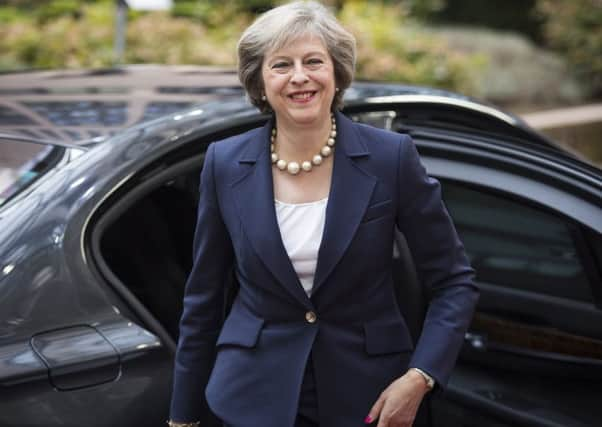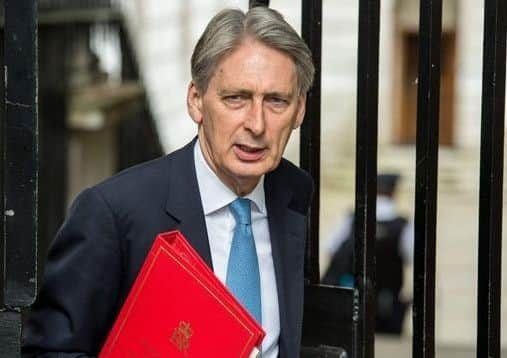What today's political leaders said about indyref 2014


With the First Minister now calling for a re-run to be held no later than the Spring of 2019, political opponents are wondering aloud whether a generation is a mere four or five years long.
However, despite Ms Sturgeon's u-turn on that decision, it's undeniable that enough political upheaval has happened in the two-and-a-half years since the first referendum than does in most generations.


Advertisement
Hide AdAdvertisement
Hide AdIndeed, the 2014 vote isn't even the most recent constitutional referendum, with the 2016 Brexit vote shocking the political establishment.
The 52-48 per cent victory for Vote Leave in that referendum put paid (for now) to the political careers of David Cameron, George Osborne, and a whole host of their allies.
With the previous 2015 General Election also relegating the likes of Ed Miliband and Nick Clegg to the parliamentary scrapheap, we now have a whole host of new political figures to be the figureheads of the fight for the Union.
We look back at what the new cast of No-vote backing characters had to say about Scottish independence in the last referendum.


Theresa May
Theresa May was nicknamed '˜the submarine' by allies of David Cameron during the Brexit campaign.
The then Home Secretary was seen as disappearing beneath the waves every time Cameron asked her to stick her head above the parapet and publicly back the Remain vote.
It was perhaps this mode of operating that enabled her to emerge relatively unscathed from that bruising referendum and assume the mantle of Prime Minister for Brexit Britain.
No such qualms troubled Mrs May during the 2014 referendum campaign, as she became in many ways the face of what became known as '˜Project Fear' '“ scaremongering to show in extreme terms what Scotland had to lose by leaving the Union.
Advertisement
Hide AdAdvertisement
Hide AdFinding a UK-wide politician who embraced this in quite as lurid terms as Mrs May would be difficult, though perhaps it was because she was speaking as Home Secretary.
The Prime Minister told a 2013 Tory conference that independence would lead to mass, unchecked immigration.
In the same speech, Mrs May said that an independent Scotland would not only be a target, but a soft target, for terrorists.
Mrs May later unleashed the old classic, that Scotland would be subject to a '˜hard border' with England, and there would be passport checks at Gretna.
It is perhaps an omen that bodes ill for future negotiations on Scotland that Mrs May's heavy handed pessimism was poorly received.
The SNP believed it was exactly the type of lurid dire warning that turned people off voting No, while the pro-union writer Alex Massie described the intervention as a '˜grubby little warning'.
Jeremy Corbyn
For a while, the only vaguely left-wing or socialist show in town was the more radical elements of the Yes campaign.
But the Labour leader in 2015 took old-school left-wing politics more mainstream than any leader since the 1980s.
Advertisement
Hide AdAdvertisement
Hide AdIn 2013 and 2014, however, Corbyn was humoured and viewed with mild amusement by his fellow Labour MPs, not fear or hostility.
A relic of a set of largely London MPs who still regard New Labour with suspicion, and rebelled with impunity, Corbyn (and his ally and now shadow Chancellor John McDonnell) had little, if anything to say on the subject of Scottish independence.
Tracking down statements that Corbyn and McDonnell made at the height of the independence campaign is hard to do, but that's not to say they were completely silent.
It could be that Corbyn was waiting to see an outcome that backed a Yes vote so he could opine that the outcome was a rejection of the same old political and economic system that he opposed.
In 2012, for example, Corbyn congratulated George Galloway for defeating a candidate from his own party in Bradford, saying Galloway's win was a '˜big message on opposition to wars and austerity.'
Philip Hammond
As Chancellor, Philip Hammond's job in any future referendum campaign will be to sell the economic benefits of staying in the United Kingdom.
He will hope, therefore, to have a smoother experience with the next referendum than he did with the first one.
In the Spring of 2014, he forced Downing Street into damage limitation mode when, in his role as Defence Secretary, he said nothing would be off the table when it came to negotiating with an independent Scotland.
Advertisement
Hide AdAdvertisement
Hide AdNumber 10 forced Hammond to clarify that he meant nothing was off the table except a currency union with the rest of the UK.
The Chancellor, currently recovering from a bruising u-turn on changes to National Insurance, was suspected by many pro-union colleagues of being the source of an explosive Guardian article which quoted an anonymous cabinet Minister saying a currency union for Trident deal could be put together after independence.
Like the now Prime Minister, Mr Hammond wasn't shy about putting the cost of independence in stark terms, claiming tens of thousands of job losses would damage Scotland, and even launching a paper which suggested '˜loyal' MoD staff in Scotland wouldn't work for a fledgling Scottish Defence Force.
Boris Johnson
A man whose naked ambition is as instantly recognisable as his hair, Boris Johnson has been on a rollercoaster ride of political fortune since the 2014 referendum.
Then the Mayor of London, an executive role with arguably more power and influence than even Scotland's First Minister, '˜BoJo' is now Foreign Secretary.
That move came after he stunned many by backing Brexit in 2016, seen by David Cameron allies as a cynical (and likely successful) ploy to gain his coveted position as Tory leader.
Before he could ascend to the throne vacated by the aforementioned Cameron, he was, to use tabloid political parlance, knifed by his erstwhile Brexit colleague Michael Gove.
Never one to avoid controversy, or speak whatever thoughts, however off-topic, pop into his head, Mr Johnson had plenty to say on the subject of an independent Scotland.
Advertisement
Hide AdAdvertisement
Hide AdHe tackled the complicated issue of Scotland's constitutional future with the same approach he has utilised in all his jobs to date.
While undoubtedly passionate, some of these interventions lacked tact, to put it mildly.
In a piece in the Sun, the then-Mayor started a short plea to Scotland to vote no with the opening line 'Scots Ahoy'.
He then listed a number of things that apparently made Scotland great, a list that was as clichéd as it was likely to fall on deaf ears.
Did Mr Johnson think Scots wanted to hear about how much English people loved porridge and Irn-Bru?
As Foreign Secretary, Mr Johnson will be forced to articulate some of the ways in which remaining in the UK boosts Scotland on the world stage.
He will have to do so with a bit more finesse than he has managed so far..
